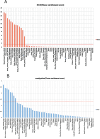Genetic overlap between schizophrenia and constipation: insights from a genome-wide association study in a European population
- PMID: 40033405
- PMCID: PMC11877780
- DOI: 10.1186/s12991-025-00551-3
Genetic overlap between schizophrenia and constipation: insights from a genome-wide association study in a European population
Abstract
Background: Patients with schizophrenia (SCZ) experience constipation at significantly higher rates compared with the general population. This relationship suggests a potential genetic overlap between these two conditions.
Methods: We analyzed genome-wide association study (GWAS) data for both SCZ and constipation using a five-part approach. The first and second parts assessed the overall and local genetic correlations using methods such as linkage disequilibrium score regression (LDSC) and heritability estimation from summary statistics (HESS). The third part investigated the causal association between the two traits using Mendelian randomization (MR). The fourth part employed conditional/conjunctional false discovery rate (cond/conjFDR) to analyze the genetic overlap with different traits based on the statistical theory. Finally, an LDSC-specifically expressed gene (LDSC-SEG) analysis was conducted to explore the tissue-level associations.
Results: Our analyses revealed both overall and specific genetic correlations between SCZ and constipation at the genomic level. The MR analysis suggests a positive causal relationship between SCZ and constipation. The ConjFDR analysis confirms the genetic overlap between the two conditions and identifies two genetic risk loci (rs7583622 and rs842766) and seven mapped genes (GPR75-ASB3, ASB3, CHAC2, ERLEC1, GPR75, PSME4, and ACYP2). Further investigation into the functions of these genes could provide valuable insights. Interestingly, disease-related tissue analysis revealed associations between SCZ and constipation in eight brain regions (substantia nigra, anterior cingulate cortex, hypothalamus, cortex, hippocampus, cortex, amygdala, and spinal cord).
Conclusion: This study provides the first genetic evidence for the comorbidity of SCZ and constipation, enhancing our understanding of the pathophysiology of both conditions.
Keywords: Constipation; Genetic Overlap; Genetic structure; Gut-brain axis; Schizophrenia.
© 2025. The Author(s).
Conflict of interest statement
Declarations. Ethics approval and consent to participate: Not applicable. The data used for analysis were obtained from published studies and public databases. The GWAS database is a database of publicly available datasets, where each study has been approved by local institutional review boards and ethics committees. Consent for publication: Not applicable. Competing interests: The authors declare no competing interests.
Figures







References
-
- Wang Q, Man Wu H, Yue W, Yan H, Zhang Y, Tan L, Deng W, Chen Q, Yang G, Lu T, et al. Effect of damaging rare mutations in synapse-related gene sets on response to short-term antipsychotic medication in Chinese patients with Schizophrenia: a Randomized Clinical Trial. JAMA Psychiatry. 2018;75:1261–9. 10.1001/jamapsychiatry.2018.3039. - PMC - PubMed
-
- Richetto J, Meyer U. Epigenetic modifications in Schizophrenia and Related disorders: Molecular scars of Environmental exposures and source of phenotypic variability. Biol Psychiatry. 2021;89:215–26. 10.1016/j.biopsych.2020.03.008. - PubMed
Grants and funding
- No. 82260938,82374454/National Natural Scientific Foundation of China
- No. 82004374/National Natural Scientific Foundation of China
- No. 82260938,82374454/National Natural Scientific Foundation of China
- No. 82004374/National Natural Scientific Foundation of China
- YD202223/Clinical Medicine Leadership Project
LinkOut - more resources
Full Text Sources
Miscellaneous

